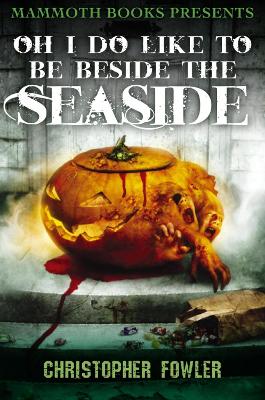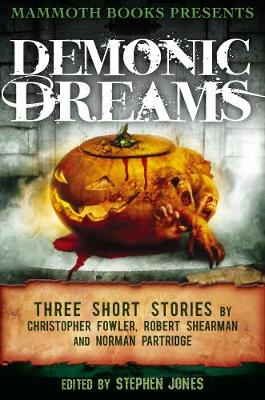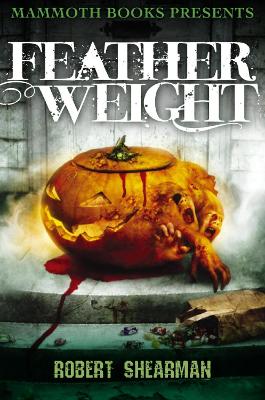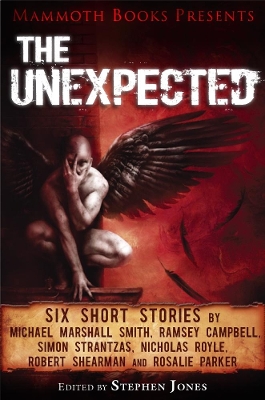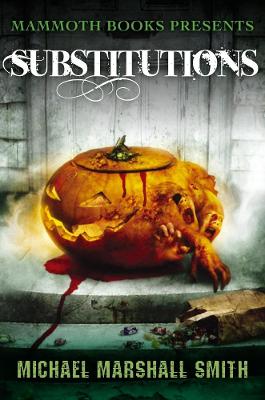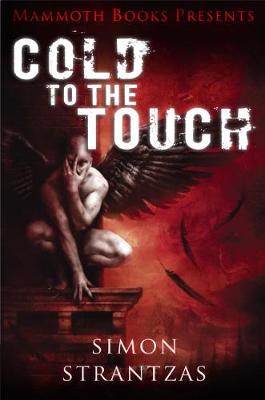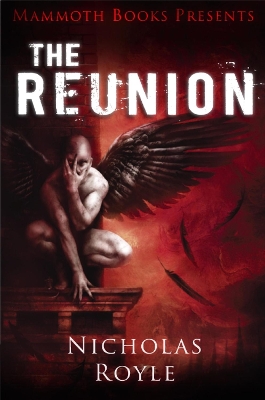Mammoth Books
7 total works
Mammoth Books presents Oh I Do Like To Be Beside the Seaside
by Christopher Fowler
'Oh I Do Like To Be Beside The Seaside' came about firstly because I was commissioned to write a story for the World Horror Convention souvenir book and, as the event was to take place in Brighton, it seemed logical to set a tale on the South coast of England.
"I had written a fantasy novel, Calabash, some years earlier, hinting at the dark madness of such seaside towns, which are the antithesis of their Mediterranean counterparts. I thought of the depressing Morrissey song "Every Day is Like Sunday", which captures the awfulness of English resorts.
"Coincidentally, Kim Newman and I were discussing the inherent creepiness of pantomime dames, and I decided it was time to give vent to my horror of these coastal pleasure domes. I wish I'd thought to include screaming gangs of hen-nighters as well. And I thought it was a nice touch to have everyone in the story telling the hero to 'fuck off' until he finally does.
Mammoth Books presents Demonic Dreams
by Christopher Fowler, Norman Partridge, and Robert Shearman
Oh I Do Like to Be Beside the Seaside - Christopher Fowler
Christopher Fowler explains "'. . . Seaside' came about firstly because I was commissioned to write a story for the World Horror Convention souvenir book and, as the event was to take place in Brighton, it seemed logical to set a tale on the South coast of England.
"I had written a fantasy novel, Calabash, some years earlier, hinting at the dark madness of such seaside towns, which are the antithesis of their Mediterranean counterparts. I thought of the depressing Morrissey song "Every Day is Like Sunday", which captures the awfulness of English resorts.
"Coincidentally, Kim Newman and I were discussing the inherent creepiness of pantomime dames, and I decided it was time to give vent to my horror of these coastal pleasure domes. I wish I'd thought to include screaming gangs of hen-nighters as well. And I thought it was a nice touch to have everyone in the story telling the hero to 'fuck off' until he finally does."
Featherweight - Robert Shearman
"I don't like writing at home much," admits the author. "Home is a place for sleeping and eating and watching afternoon game shows on TV. There are too many distractions. So, years ago, I decided I'd only write first drafts in art galleries.
"And the best of them all is the National Gallery, in London, a pigeon's throw from Nelson's Column. I can walk around there with my notebook, thinking up stories - and if I get bored, there are lots of expensive pictures to look at. Perfect.
"A lot of those paintings, however, have angels in them. They're all over the place, wings raised, halos gleaming - perching on clouds, blowing trumpets, hovering around the Virgin Mary as if they're her strange naked childlike bodyguards. And I began to notice. That, whenever the writing is going well, the angels seemed happy, and would smile at me. And whenever the words weren't coming out right, when I felt sluggish, when I thought I'd rather take off and get myself a beer, they'd start to glare.
"I wrote this story in the National Gallery. Accompanied by a lot of glaring angels. Enjoy."
Lesser Demons - Norman Partridge
"I was surprised to receive an invitation for S.T. Joshi's Black Wings," reveals Partridge, "an anthology of Lovecraftian fiction. Although I knew S.T. admired my work, I've never quite seen myself as a Mythos writer.
"While I respect H.P. Lovecraft and his contribution to horror, I've never felt that his worldview (or maybe I should say universeview) meshed with mine.
"In the end, that's what made the story work . . . at least for me. I concentrated on my differences with Lovecraft, and approached the material from a place where Jim Thompson would be more comfortable than HPL. And I'm delighted that so many people have enjoyed the tale - it was a lot of fun to write."
I don't like writing at home much," admits Shearman. "Home is a place for sleeping and eating and watching afternoon game shows on TV. There are too many distractions. So, years ago, I decided I'd only write first drafts in art galleries.
"And the best of them all is the National Gallery, in London, a pigeon's throw from Nelson's Column. I can walk around there with my notebook, thinking up stories - and if I get bored, there are lots of expensive pictures to look at. Perfect.
"A lot of those paintings, however, have angels in them. They're all over the place, wings raised, halos gleaming - perching on clouds, blowing trumpets, hovering around the Virgin Mary as if they're her strange naked childlike bodyguards. And I began to notice. That, whenever the writing is going well, the angels seemed happy, and would smile at me. And whenever the words weren't coming out right, when I felt sluggish, when I thought I'd rather take off and get myself a beer, they'd start to glare.
"I wrote this story in the National Gallery. Accompanied by a lot of glaring angels. Enjoy.
Mammoth Books presents The Unexpected
by Michael Marshall Smith, Nicholas Royle, Ramsey Campbell, Robert Shearman, Rosalie Parker, and Simon Strantzas
What Happens When You Wake Up in the Night - Michael Marshall Smith
For Michael Marshall Smith, this was one of those stories that dropped straight into his head, but the problem was that he didn't want it: "It wasn't an idea I liked. It was clearly some part of my brain serving up a notion simply because it could, and because it knew it could frighten me with it.
"It did frighten me, and so I did what I always do when that happens - which is write it down, in the hope it will go away."
Respects - Ramsey Campbell
"'Respects' was suggested by a local incident in which a car thief in his early teens killed himself while fleeing the police," recalls Campbell. "A lamp standard at the site of his demise is still decorated with flowers years after the incident, and the tributes on the obituaries page of one Wallasey newspaper were at least as grotesque as the ones I've invented - the romanticisation of a petty criminal.
Cold to Touch - Simon Strantzas
"Stories often find their origins in unexpected ways," Strantzas reveals. "I was inspired in this case by a photograph of a Zen garden I once used as my computer's desktop background.
"There was something there in the coldness of the photograph, something that brought to mind the barren vistas of the Canadian Arctic, which ended up being the perfect setting for my tale of tested faith."
The Reunion - Nicholas Royle
"'The Reunion' is based on actual events," reveals the author, "but the story only really came into focus for me when I was invited to contribute to Ellen Datlow's Poe anthology.
"Poe is brilliant. I was at a conference recently where a teacher revealed that she had read Poe's 'The Black Cat' to a lecture theatre full of schoolchildren. She switched off all the lights and used a torch to read by. A number of parents lodged complaints, which she took as a measure of the event's success. My tale is inspired by a different Poe story."
Granny's Grinning - Robert Shearman
"I love Christmas," says Shearman. "Always have done, and always a bit too passionately. The intensity with which I loved Christmas was delightful when I was eight years old, slightly unusual by the time I was eighteen, and increasingly disturbing thereafter.
"I was the last one to grow up. It suddenly dawned on me one year, looking into the faces of my parents, and of my sister, that they were all older, and fatter, and less and less festive. And that they were trying so hard to keep me happy each Christmas, pretending they wanted all those presents I'd bought, all those sausage rolls and Quality Street chocs. That what I was trying to do, each December, was somehow reach back into the past and resurrect a time that was dead, that was long dead.
"I still love Christmas. But now I recognize - as I still make them perform party games, as I still make them open their gifts and smile and say thank you - that they're zombies now. All of them, zombies. I'll never get my childhood back again, not really, or the innocence of that family get-together. So I'll make do with the dead, and pretend.
"This is a story all about that."
In The Garden - Rosalie Parker
"'In the Garden' was written after I challenged myself to write a horror story about gardening," explains the author. "It emerged more quickly and easily than anything I've ever written. I think of it more as a prose poem than a story."
Taken from The Mammoth Book of Best New Horror 22, edited by Stephen Jones.
As Smith recalls: "This story came about in the simplest way, the way I always enjoy most - something happening in real life that makes you think 'What if?' "Our household gets a lot of its food via an online delivery service, and one day when I was unpacking what had just been dropped at our house I gradually realised there was something...not quite right about the contents of the bags.
"There's two things that are strange about that experience. The first is that - given that every household is likely to buy at least some things in common - you don't realise straight away that you've been given the wrong shopping. You don't immediately think 'This is wrong', more like . . . 'This is weird'. The second is how personal it is, gaining accidental access to this very tangible evocation of some other family's life. You can't help but wonder about the people the food was really destined for.
"In real life, I just called up the delivery guy and got it sorted out: but in fiction, you might tackle things slightly differently . . ."
